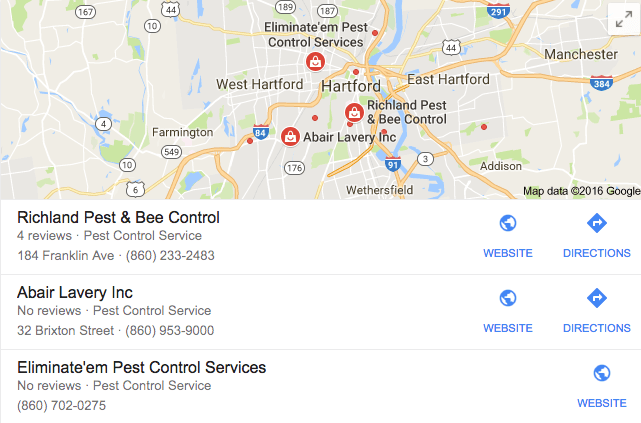At the start of September 2016 there was substantial movement in Google organic results and the local pack. The unconfirmed update (dubbed the Possum update) has now been acknowledged by the SEO community as one of the biggest updates to local search results since Venice.
It’s important to mention that Possum isn’t an algorithm that penalizes your website or its content, it’s a filter for listings generated by queries with a local intent. This is why it’s important to use local keyword tracking, and not all keyword tracking platforms support this.
Google are also constantly tweaking this algorithm, and have been testing various aspects of the local map pack, as well as other now-cards related to local search, but here are the key things that we’ve seen change since the Possum update landed in September.
A users IP location is now more important when defining rankings
This move tells us that Google is a lot more confident about the data that it is collecting from users, so much so it is using IP as a more important factor when determining the physical location of a user and what results it displays them.
Tracking keywords within Google.co.uk if you have a local audience may be a thankless task.
I personally have clients that have a limited customer base, we know from research that people are willing to travel roughly 100 miles to their bricks and mortar location for the service that they provide; so we track their primary keywords in Google.co.uk, Google.co.uk with the location set as Manchester, and Google.co.uk with the location set as Leeds).
Within their local areas, where their customers are, they rank on page one/high end of page two for competitive terms, but in Google.co.uk – taking into account national competition that isn’t actually direct competition, they’re on page three and four.
It’s also important to remember that if you have a client in Los Angeles and you’re based in San Francisco, you may see different search results when you do a manual search. In order to alleviate any panic, it might be worthwhile educating your client about this ahead of time.
Businesses outside of a city’s physical limits saw a boost
Local results and the map pack used to have a certain element of proximity about them. This boost has primarily helped businesses based away from the city center, for example your primary customer base may be in Hartford, CT but your business trades out of/is registered in New Britain, which is 9 miles south of Hartford but still part of Hartford County.
Previously you may have struggled to appear in the map pack for people looking for the services you provide in Hartford, but the new update has made this easier for you as town center/city center real estate is expensive and impractical for a lot of businesses.


Possum has made it easier for businesses outside of the city centre to appear in the map pack.
Virtual offices and shared locations can be detrimental to your organic search visibility
Google has been filtering listings that share the same phone number for a while now, but it also now appears to be filtering out businesses that share the same address (such as virtual offices).
We’ve seen this particularly with businesses that cohabit a business park or building with other, similar businesses – you may find that your listings are filtered out. Google is getting better at understanding ‘identity’, but at the moment it is still trying to filter out spam and duplicate content, as well as give users choice.
What should you do to convince Google your listing is valuable and unique enough to be included in the top results?
- Make your business listing information NAP (Name, Address and Phone) is accurate everywhere online, and is as unique as possible.
- Make sure your Bing Places and Google My Business listings are accurate.
- Create ‘local’ content on your website geared towards your target audience.
- Encourage customers to leave genuine Google reviews.

